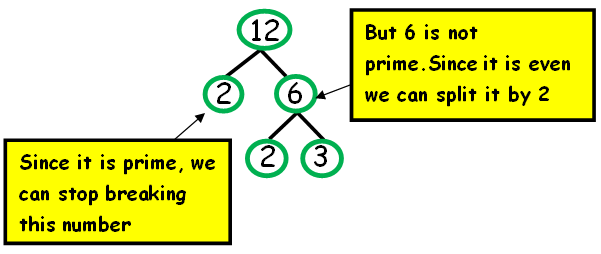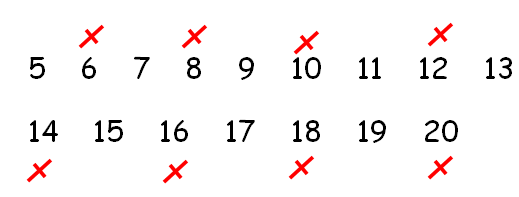PRIME OR COMPOSITE
Subscribe to our ▶️ YouTube channel 🔴 for the latest videos, updates, and tips.
Definition of Prime Number
A prime number is a whole number that only has two factors which are itself and one.
2 is the only even prime number.
Definition of Composite Number
A composite number has factors in addition to one and itself. The numbers 0 and 1 are neither prime nor composite.
All even numbers are divisible by two and so all even numbers greater than two are composite numbers.
How to check whether the a number is prime or not?
(i) First we have to check the the given number is odd or even
(ii) If it is even number other than 2, we can say it is not not prime. Because all even numbers except 2 are composite numbers.
(iii) If it is odd, we have to check whether it is divisible by 1 and itself only.
How to find prime factor of a composite number ?
To find the prime factors of a number, first start by dividing the number by the smallest prime number, which is 2.
For example, let us see how to find the prime factor of 12.

24 can be written as follows.
24 = 22 x 3
So, the prime factors of 24 are 2 and 3.
Solved Questions
Question 1:
Is 6 a prime number. If not give reason for your answer.
Solution :
No, 6 is not a prime number.
Reason :
Because it has more than two factors. Being a prime number, it must divisible by 1 and itself only. But 6 is divisible 2 and 3 other than 1 and itself. So it is not prime number.
Question 2 :
Is 13 a prime number.
Solution :
Yes, 13 is a composite number.
Reason :
Because it is divisible by 1 and itself only.
Question 3 :
Write the prime numbers between 5 and 20
Solution :
First write all numbers between 5 to 20

Now we have to mark the even numbers, because even numbers are divisible by 2.

Now we have to check the remaining numbers one by whether it is prime or not.
5 - has only two divisors 1 and 5
7 - has only two divisors 1 and 7
9 - Since it is odd, it is divisible by 1,9 and 3. So it is not prime.
11 - has only two divisors 1 and 11
13 - has only two divisors 1 and 13
15 - has only two divisors 1 and 15
17 - has only two divisors 1 and 17
19 - has only two divisors 1 and 19
So, the prime numbers between 5 and 20 are 5, 7, 11, 13, 15, 17 and 19.
Subscribe to our ▶️ YouTube channel 🔴 for the latest videos, updates, and tips.
Kindly mail your feedback to v4formath@gmail.com
We always appreciate your feedback.
About Us | Contact Us | Privacy Policy
©All rights reserved. onlinemath4all.com

Recent Articles
-
SAT Math Problems and Solutions
Feb 14, 26 06:05 AM
SAT Math Problems and Solutions -
SAT Math Practice Questions with Answers
Feb 14, 26 05:47 AM
SAT Math Practice Questions with Answers -
SAT Math Practice Test with Answers
Feb 14, 26 02:30 AM
SAT Math Practice Test with Answers

